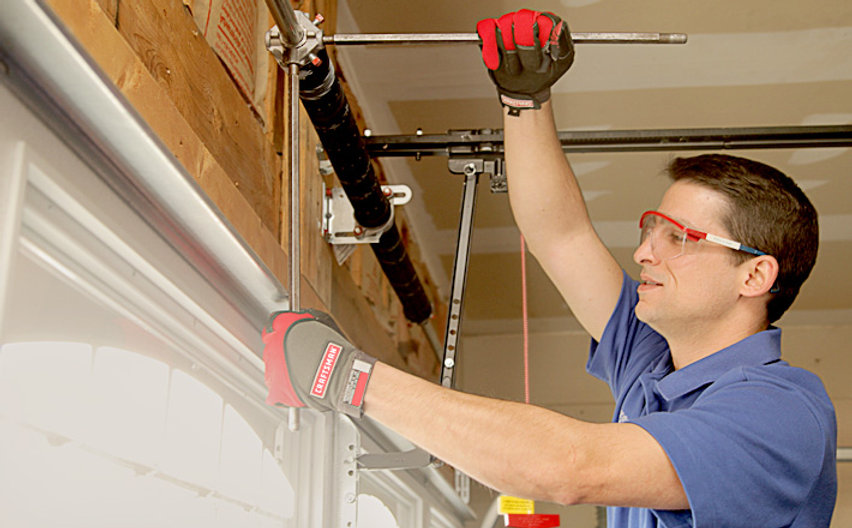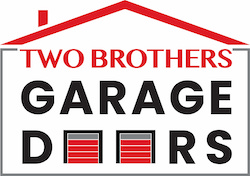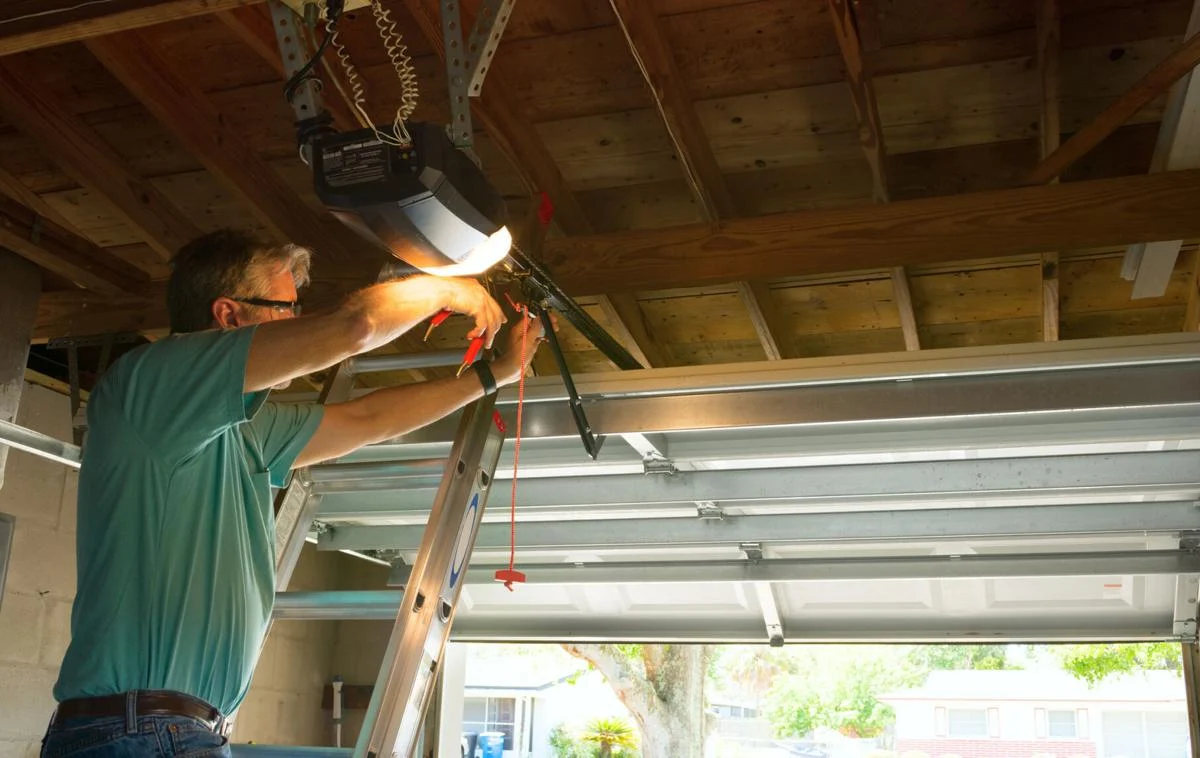
How to Fix a Noisy Garage Door
Imagine it’s a peaceful Sunday morning. The sun is shining, the birds are chirping, and you’re enjoying a well-deserved sleep-in. Suddenly, your garage door starts squeaking, waking you and your neighbors up. A noisy garage door can be a sign of underlying issues that, if left unchecked, could lead to costly repairs. Keeping your garage door quiet ensures smooth operation and prolongs its lifespan. This guide will walk you through the common causes of garage door noise and offer practical steps to fix them. By the end, you’ll have a quieter, smoother-operating garage door.
What Causes a Noisy Garage Door
Understanding what’s making your garage door noisy is the first step to fixing it. Here are some common reasons your garage door is making noises:
Lack of Lubrication
About 30% of garage door noise issues are caused by a lack of lubrication. Over time, the moving parts of your garage door, such as hinges, rollers, and springs, can lose lubrication. This causes friction and creates squeaking or grinding noises. Regular lubrication will keep everything running smoothly and quietly.
Loose Hardware
An average garage door is opened and closed 1,500 times a year, which can cause nuts and bolts to become loose over time. When loose, they will create rattling and banging noises. Regularly check and tighten the hardware to prevent these issues and keep the door running quietly.
Worn Rollers and Hinges
Worn-out rollers and hinges are another common cause of a noisy garage. These parts can get damaged over time, causing more friction and noise when the door moves. If you hear grinding or scraping sounds when opening or closing your garage door, it might be time to check and replace the rollers and hinges.
Tension Issues with Torsion Springs
Torsion springs help balance your garage door’s weight, making it easier to open and close. When torsion springs become imbalanced or loose, they can cause clanging noises. Fixing these springs can be dangerous, so it’s important to be cautious and consider hiring a professional garage door technician. They will have the right tools and expertise to adjust the tension safely and get your garage door back to operating quietly.
Off-Balance Door
An off-balance garage door can create scraping, banging, and popping noises. If you hear something scraping, it means the door is rubbing against the house, while banging is a sign that it’s off the track. A popping sound is usually a sign that a garage door spring has snapped. To check if your garage door is off-balance, disconnect the opener and manually open the door halfway. If it doesn’t stay in place, it’s likely imbalanced. We don’t recommend fixing this yourself since it often involves adjusting the springs or tracks, which can be dangerous. Instead, it’s best to seek professional help to fix an off-balanced door safely.
How to Fix a Noisy Garage Door

Now that you know why your garage door makes noise, let’s look at how to fix it. Follow these easy steps to make your garage door quieter and work better. Here’s what you can do to make it run smoothly and with less noise.
Safety First!
Before fixing anything, remember safety first. Garage doors are heavy and can be dangerous. Always unplug the garage door opener and make sure the door is closed. And always make sure to wear gloves and some type of eye protection.
Gather Your Tools
You’ll need a few basic tools to get started:
- Socket wrench
- Screwdriver
- Silicone spray or white lithium grease (avoid using WD-40, as it can attract dirt)
- Ladder
Having these tools ready will make the repair easier and faster.
Lubrication
Proper lubrication is key to reducing friction and stopping your garage door from making squeaking or grinding noises. Follow these steps to lubricate the rollers, hinges, and springs:
- Clean the Parts: Use a clean cloth to wipe away any dirt or debris from the rollers, hinges, and springs.
- Apply Lubricant: Lubricate with a silicone spray or white lithium grease. Apply a small amount of lubricant, making sure it covers each part evenly. Don’t use WD-40 as it can attract dirt and debris.
- Lubricate Springs: Lightly coat the torsion springs to reduce noise.
We highly recommend lubricating these parts every six months. Avoid getting lubricant on any plastic parts, as it can cause them to deteriorate over time.
Tightening Hardware
Loose hardware is responsible for approximately 25% of garage door noise problems. The first step should be to inspect and tighten all the nuts and bolts on the tracks, rollers, and garage door opener. Use a socket wrench or screwdriver to make sure everything is fastened. Pay special attention to the bolts that attach the door to the tracks.
Inspecting Rollers and Hinges
Worn-out garage door rollers and hinges can create grinding or scraping noises. Here’s how to inspect and replace them:
- Inspect Garage Door Rollers: Check the rollers for signs of wear and tear, like cracks or flat spots. If you see any damage, consider replacing them with nylon rollers, which are quieter than metal ones. Replacing worn rollers can reduce garage door noise by up to 75%.
- Check Hinges: Inspect the hinges for signs of wear or damage. If you notice cracks or excessive wear, replace them with new ones.
Extra Tips to Make Your Garage Door Quieter
Is your garage door still noisy even after maintenance? Regular attention and a few upgrades can make a big difference in reducing the noise from your garage door. Here are some extra tips to help make your garage door run quieter and smoother.
Upgrade to Nylon Rollers
Nylon rollers are quieter than steel ones and require less lubrication. They can significantly reduce the noise level of your garage door.
Install a Noise-Isolating Garage Door Opener
Modern garage door openers are designed to be quieter. Belt-drive openers, in particular, are much quieter than chain-drive models. Consider upgrading to one of these to reduce noise.
Add Noise Insulation
Adding noise insulation to your garage door can help make it quieter. You can do this by attaching insulation panels or soundproofing materials to the door.
When to Call a Professional
While many garage door repairs can be done yourself, some issues are best left to the professionals. Here are a few instances when you should call a professional:
Issues with the Torsion Spring System
Torsion springs are under high tension and can be dangerous to work with. If you suspect a problem with your springs, it’s best to call a professional who has the tools and expertise to handle them safely.
Broken Cables or Opener Malfunctions
Broken cables or issues with your garage door opener can be complex and hazardous to repair on your own. A professional can safely diagnose and handle these repairs.
Extensive Repairs Beyond Basic Maintenance
If your garage door needs more than basic maintenance, it’s smart to seek professional help. They can check everything thoroughly and recommend the best course of action.
Conclusion
A noisy garage door isn’t just a minor irritation – it’s like a cry for help from your garage. It could mean there are bigger issues lurking around. But don’t worry! By learning what causes the noise and following the tips in this guide, you’ll soon have a door that’s as quiet as a mouse. Regular garage door maintenance, like a bit of lubrication and tightening up the loose bits, can keep those annoying noises at bay and make your garage door last longer. And remember, if things get a bit too complicated or you’re just not feeling up to the task, don’t hesitate to call in a garage door technician.



